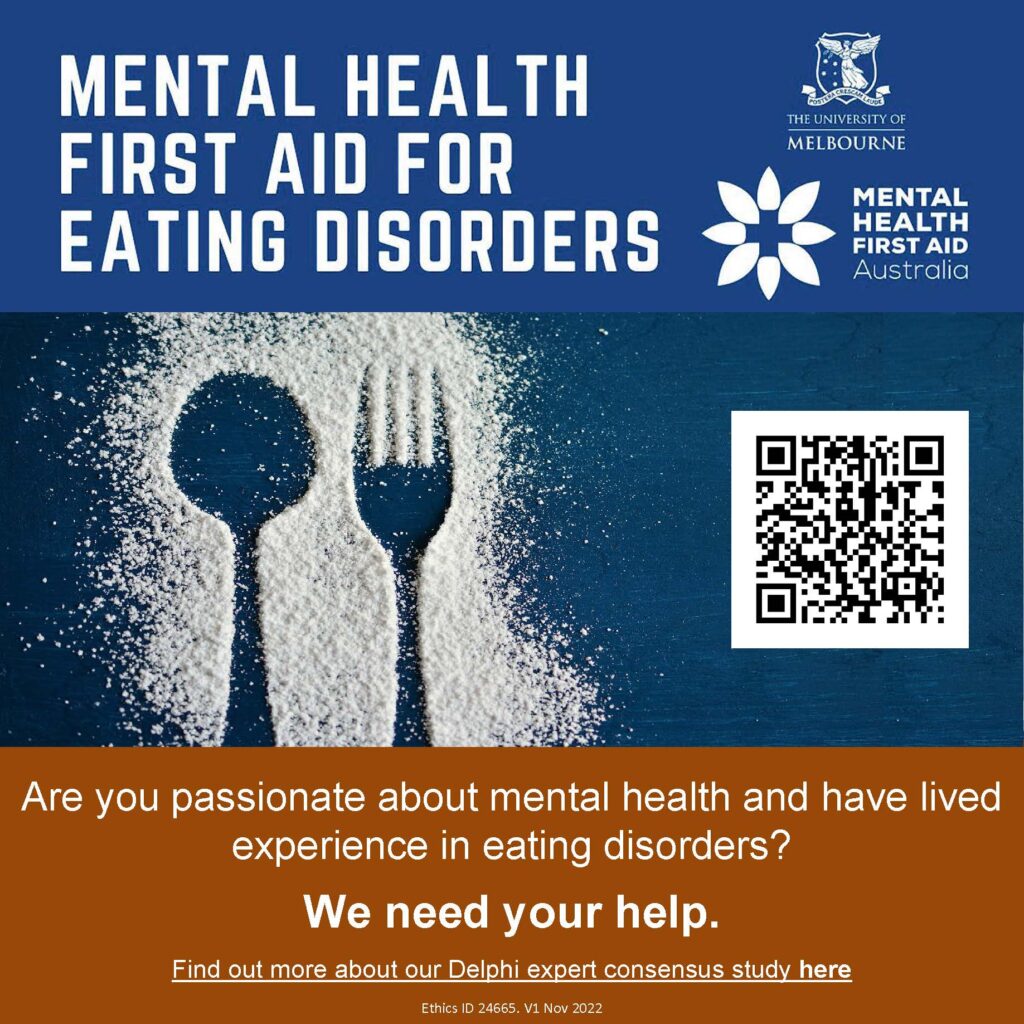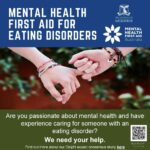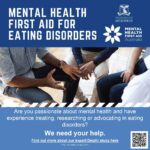Voice of experience vital in major update of mental health first aid for eating disorders

Voice of experience vital in major update of mental health first aid for eating disorders
Do you want to help someone struggling with eating disorder symptoms, but lack confidence to intervene, in case you say the “wrong” thing? The good news is that with mental health first aid guidance you can be confident that you are doing no harm and highly likely are helping to save a life. The secret is to be well-informed.
Excitingly, right now a research call is out for people with experience of eating disorders. Your voice counts! Your participation is sought in a Delphi* study, led by Dr Laura Hart, to update the decade-old mental health first aid guidelines for this illness. Dr Hart and her team want to hear from people with eating disorder (ED) experience, from caregivers, and from health professionals with ED expertise.
Dr Hart, of the University of Melbourne, says widespread input into this update is important because the COVID19 pandemic has seen an increase in disordered eating and ED presentations.
Participating countries in the study comprise Australia, Austria, Canada, Denmark, Finland, France, Germany, Republic of Ireland, Luxembourg, the Netherlands, New Zealand, Sweden, Switzerland, the United Kingdom, and the United States of America.
More eating disorder experiences are affecting a greater diversity of people
“Around Australia, and internationally,” Dr Hart says, “there are reports of younger people presenting to services more medically compromised than ever before.
“We are also seeing more new mothers, gender and sexually diverse people, males, first nations and other marginalised groups, experience eating disorders than ever before. “Recognising that a loved one, friend or colleague is beginning to struggle with their eating, body image or exercise—then having a supportive conversation about your concerns and the benefits of seeking appropriate help—is an important part of the recovery journey. But many of us freeze in fear at the thought of having that talk, or don’t know if it’s really a problem worth stressing about.
“This new study is designed to provide guidance to all community members, backed by science, about how to recognise the warning signs of an eating disorder, then have a supportive conversation to help the person early.”
With the previous study in 2009, the suggestions reviewed about how to help someone with an ED were not very prevalent in the public domain (i.e., results of a google search on how to help a friend/child/loved one) would focus heavily on low-weight eating disorders.
“We now recognise a much wider array of disordered eating experiences and their presence in a diverse group of people,” Dr Hart says.
‘We need experts in experience to tell us what good first aid looks like’
“Providing evidence-based strategies for all those people, taking into account their various identities and cultural influences, is incredibly important in creating first aid guidelines.
“I hope that we can get strong participation from people with lived experience of an ED, those who have loved and cared for individuals with eating disorders, and professional researchers/clinicians in eating disorders.
“We need strong representation across our group of participants, for our resulting guidelines to represent the many and varied experiences of eating disorders. We want to create information that is safe and reliable for most people, most of the time, and to achieve this we need the experts participating and telling us what good first aid looks like.”
About this study

Dr Laura Hart
Dr Hart explains:
Researchers from Mental Health First Aid Australia and The Centre for Mental Health at the University of Melbourne are working together to update the Mental Health First Aid guidelines for eating disorders. Mental Health First Aid Australia is a not-for-profit organisation focused on mental health training and research and The Centre for Mental Health is based at the Melbourne School of Population and Global Health at the University of Melbourne.
What we are doing
We are conducting a Delphi expert consensus study to update the mental health first aid guidelines for how a member of the public should give assistance to a person who is experiencing an ED. This involves asking three different types of experts (lived experience advocates, carer advocates and professionals) to agree on which strategies are the best and safest for supporting someone with an ED. We aim to build agreement over three rounds of online surveys.
Who we are looking for
We are inviting people who are aged 18 years or older, can read and write in the English language sufficient for survey completion, live in one of the nominated countries, and who have expertise in eating disorders to participate in this research. We are seeking three different groups of experts:
 Lived experience: to participate in this group, you must
Lived experience: to participate in this group, you must
- have lived experience of eating disorders and currently consider yourself recovered or well enough to participate,
- and be involved in advocacy or support activities that give you a broad understanding of the range of experiences of living with an eating disorder (e.g., you are a member of an advisory group, an advocacy organisation, or provide peer mentoring etc).
 Caring experience: to participate in this group you must
Caring experience: to participate in this group you must
• have experience caring for or providing significant daily support to someone with an eating disorder,
- and be involved in advocacy or support activities that give you a broad understanding of the range of experiences of caring for someone with an eating disorder (e.g., you are a member of an advisory group, an advocacy organisation, or provide peer mentoring etc).
 Professional experience: to participate in this group you must be
Professional experience: to participate in this group you must be
- 18 years or older
- are a qualified/accredited clinician or researcher with a special interest in eating disorders
- have at least five years’ experience working in the area of eating disorders.
Nominated countries for participation: Australia, Austria, Canada, Denmark, Finland, France, Germany, Republic of Ireland, Luxembourg, the Netherlands, New Zealand, Sweden, Switzerland, the United Kingdom, or the United States of America.
If you meet these criteria, we would be grateful if you would consider being involved, as well as suggesting this study to other people you know with similar expertise.
Why we are doing it
There are current mental health first aid guidelines for eating disorders that were developed in 2009 (https://mhfa.com.au/sites/default/files/MHFA_eatdis_guidelines_A4_2013.pdf). Given that they are more than 10 years old, the present study aims to update these guidelines to include any new knowledge or experience with eating disorders. The guidelines will be available for download on the Mental Health First Aid Australia website (mhfa.com.au) and will be used to develop Mental Health First Aid training courses around the world.
How we are doing it
The guidelines will be formed on the basis of expert consensus. We are looking for first aid strategies that have a very high level of agreement among the three different groups of experts outlined above (lived experience, caring experience and professionals). We are asking all experts to complete online surveys where they will rate a range of strategies for helping someone with an eating disorder. The strategies with the highest level of agreement across the three different groups of experts will be included in the mental health first aid guidelines.
The strategies to be rated in the surveys have come from websites, books, fact sheets, brochures, scientific journal articles and training course materials. Some of the strategies may seem incorrect or insensitive. However, these are included because they reflect the wide range of people’s beliefs about how to support someone with an ED. We are asking the experts to decide which strategies are the best and safest for inclusion in the mental health first aid guidelines.
What will I be asked to do?
You will be asked to complete up to three online surveys over about four to six months (so no travel or meetings!) and the total estimated time commitment is approximately four hours.
What are the possible benefits?
This project will lead to better community support for people with eating disorders by providing best-practice strategies for giving mental health first aid. The guidelines developed by this project will be integrated into Mental Health First Aid training programs internationally, especially among countries with established MHFA training organisations and developed health systems.
We cannot guarantee that people who participate in this project will benefit from participation, but we have found that many people report pride at having participated and are glad they were able to contribute to this important research.
Are there any risks?
We do not expect that you will experience any risk or discomfort by participating in this research. In the unlikely event that you feel upset at some stage during your participation you can contact the crisis support service in your country, listed at the end of this page.
Will I be reimbursed for my time?
Participants who complete all three surveys will be offered an honorarium of AU$200 or equivalent (in the local currency if possible) as an electronic shopping voucher.
If you change your mind
Participation in this project is voluntary. If you change your mind about participating, you are free to withdraw from the project at any time until the last survey is closed. You may also withdraw your data if you wish, up until the individual survey is closed. Simply contact the project administrator, Ms Simone Baillie (participate@mhfa.com.au).
Participants will be assured that any existing relationships they have with the organisations involved in this research will not be affected should they choose to withdraw from the study.
Your privacy
Any data we collect from you will be held under password protection and not given to others. We are interested in the agreement among groups of experts, rather than the views of individual members, so your individual answers will never be reported in materials we publish. We will only present the results in summary form.
We may sometimes use participant quotes in published journal articles, but when this occurs, we will not give any identifying information and it will not be possible for readers to know who provided the quote.
Due to research code requirements, we will be storing the information collected for 5 years after the study, but none of your information will be identifiable or be able to be traced back to you.
Who can I contact if I have concerns about the project?
If you have concerns about the scientific aspects of the study, please contact the coordinator of the project, Ms Simone Baillie (participate@mhfa.com.au, +61 3 9079 0200) or the responsible researcher, Dr Laura Hart (lhart@unimelb.edu.au, +61 4 2154 8505).
This project is funded by MHFA Australia and has human research ethics approval from The University of Melbourne [Project ID 24665].
If you have any concerns or complaints about the conduct of this research project, which you do not wish to discuss with the research team, you should contact the Research Integrity Administrator, Office of Research Ethics and Integrity, University of Melbourne, VIC 3010. Tel: +61 3 8344 1814 or Email: research-integrity@unimelb.edu.au. All complaints will be treated confidentially. In any correspondence, please provide the name of the research team and/or the name or ethics ID number of the research project.
For more information, see https://melbourneuni.au1.qualtrics.com/jfe/form/SV_0B1SjoaUJqw2CI6
Support Contacts
Australia: Lifeline on 13 11 14
Austria: Telefonseelsorge: 142
Canada: National Suicide Prevention Lifeline on 1800 273 TALK (8255) Denmark: Suicide hotline 70 201 201
Finland: SOS Crisis Centre 010 195 202
Germany: Suicide Hotline: 0800 1810 771
France: Suicide écoute: 01 45 39 40 00
Luxembourg: SOS Distress: 352 45 45 45
Project ID: 24665 Version 2. Mar 2023 3
The Netherlands: Suicide hotline 113Online
New Zealand: Lifeline Aotearoa on 0800 543 354
Republic of Ireland: Samaritans on 116 123
Switzerland: Die dargebotene Hand: 143
Sweden: Suicide hotline 020 22 00 60
UK: Samaritans: 116 123
USA: National Suicide prevention Lifeline on 1800 273 TALK (8255)
*The Delphi technique is a well-established approach to answering a research question through the identification of a consensus view across subject experts. It allows for reflection among participants, who are able to nuance and reconsider their opinion based on the anonymized opinions of others.






Hello,
I have a lifetime of eating disorder experience and am interested in participating in the study.
Best,
Benette
Dear Bennett, thank you for your message. To find out more about the study, and to participate, follow this link: https://melbourneuni.au1.qualtrics.com/jfe/form/SV_0B1SjoaUJqw2CI6
I always find that participating in eating disorder research is very helpful to not only others, but also to myself, and I expect you will, too.
Warmly, June
Are you still looking for participants in the study?
Best,
Benette
hi Bennett, I suggest you follow the online link in the article and contact the researchers to ascertain if the call for participants remains open.
Warmly,
June